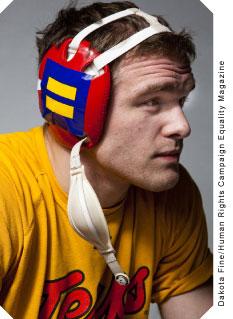
Hudson Taylor
Hudson Taylor, a lifelong athlete and three-time NCAA All-American wrestler, is the founder of Athlete Ally, a nonprofit sports resource which, according to its website: “encourages all individuals involved in sports to respect every member of their communities, regardless of perceived or actual sexual orientation, gender identity or gender expression, and to lead others in doing the same. Athlete Ally provides social advocacy campaigns, on-campus trainings and practical tools including resources to locate and learn about allied athletes, coaches, teams, athletic clubs and sports-based advocacy projects around the country.” You may also remember Hudson from his video “Time To Evolve” which was posted on the FBomb this past summer.
Hudson recently agreed to answer some questions about his work as an LGBT ally in the athletic community and beyond for the FBomb.
What inspired you to start the Athlete Ally? You’ve said before that you haven’t always considered yourself an ally (at least actively). Was there a specific moment or breaking point, so to speak, that incited you to act?
I was inspired to start Athlete Ally because of an interview I gave my senior year of college. I started the season wearing a Human Rights Campaign sticker on my wrestling headgear to show support for the LGBT community. After interviewing about why I wanted to speak out and take a stand, I received over 2,000 emails from closeted kids across the country. It was at that point I realized the power and importance of straight allies and that if I could get a football player or basketball player to take a similar stance as an athlete ally, it would potentially save lives. With that in mind, Athlete Ally was born.
How did your friends, family and teammates react when you decided to call yourself an ally? What did you do to educate those around you?
Unfortunately, there is still a stereotype that you have to be of the LGBT community to advocate for the LGBT community. Because of this, I often fielded questions about my sexual orientation and had homophobic slurs directed at me. To change this and educate those around me, I needed to frame my advocacy in a way that addressed what my teammates cared about: winning. By engaging in conversations about how diversity is beneficial to athletic success, my teammates were able to see the value and importance of LGBT allyship and start speaking out.
Why do you think there seems to be so much intolerance amongst athletes as opposed to any other group/community?
Athletics continues to be a comparatively intolerant place because sport is based upon a competitive reward structure, which requires athletes to judge one another on physical attributes to gain position and status. Because athletic success is associated with traditional gender scripts, athletes self-socialize one another by rewarding those who conform to those scripts and diminish and oppress those who do not. This, in turn, creates an environment where gay men and women feel as though they must remain closeted to either uphold stereotypical masculinity or defend against being perceived to be a lesbian.
Do you consider yourself a feminist? If so, how do you think your feminist identity impacts your work?
Yes! I believe that sexism and homophobia are mutually exclusive from one another, and that if we are going to make meaningful strides toward ending homophobia in sports we must equally address the inherent sexism in sports. In this way, my feminist identity allows me to embrace and advocate for an inclusive understanding of masculinity and femininity regardless of sexual orientation, gender identity, or gender expression.
Do you feel that issues of masculinity are being adequately addressed?
I do not think there is enough of a dialog occurring about how heterosexism and homophobia adversely affects the lives of straight men. We often hear how homophobic and sexist slurs damage women and the LGBT community, but rarely do we talk about how that language impacts the men that use it. I believe we will see far more progress in challenging and ending that type of language when we engage in conversations about what it really means to be “masculine.”
Have you had specific interactions with people through your work that really stick with you? For instance, did you ever have a great experiencing changing somebody’s mind about the LGBTQ community, or engage in a debate that changed your perspective?
The first thing that comes to mind is the person that initially inspired me to speak out: Gloria Steinem. I have had the honor and pleasure of meeting so many brave and passionate people, but it was a speech Gloria Steinem gave that influences much of what I do today. She said, “go towards the fear.” We all have an intuitive understanding of what is right and wrong, but rarely do we act when an opportunity presents itself. That simple phrase continues to push me to speak louder and do more.
Do you have any advice for teens and young adults who feel passionately about a cause, but don’t know what to do to get involved / take action?
Organize. Mobilize. Change the world.
There is unimaginable strength in numbers. If you are passionate about a cause, make a petition, get signatures, share it with your school or local newspaper, and then use that coverage to make a difference. Solving the smaller problems specific to your school or community will lead to greater action.

